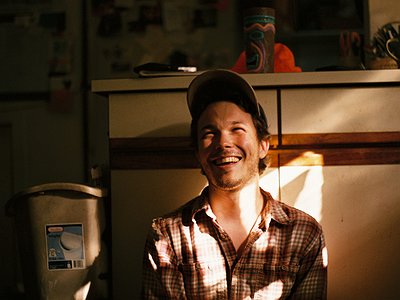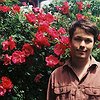Part 1
Name: Michael Cormier
Nationality: American
Occupation: Songwriter, singer
Current Release: Michael Cormier's More Light!! is out now via Oof Records & Dear Life Records.
Recommendations: My work in song is indebted to the writing of Virginia Woolf. I recommend ‘To The Lighthouse’ as an exciting start point to those who have never read her. It balances all of her strengths in form and experimentation. If you get through that one craving more, dive into ‘The Waves,’ which I consider to be one of the great masterpieces of Western fiction. Never has a book made me feel more alive.
The most transcendent musical performance I’ve ever been a part of was singing in an eighty-person choir accompanying the Columbus Symphony Orchestra’s performance of Arvo Pärt’s ‘Te Deum.’ It’s a piece of understated enormity. Set aside thirty-two minutes of your day, close your eyes, and let that music scrub you clean.
If you enjoyed this interview with Michael Cormier and would like to find out more about him and his work, visit his bandcamp store for more music.
When did you start writing/producing music - and what or who were your early passions and influences? What was it about music and/or sound that drew you to it?
I grew up with musician parents, so I was playing from a very young age. Instruments were strewn all over the house. I was able to learn by banging on all sorts of instruments very poorly with no consequence, like how one learns to speak a first language. I would listen to recordings, primarily by The Who and Yes, and then try to emulate them.
I was inspired to start writing/recording my own songs in no small part by Sufjan Stevens’ ‘Illinois.’ The grandiosity of his sonic universe and how it interacted with the vulnerability of his songwriting blew my brain wide open. I used to listen to that record while mowing the lawn, at max volume to hear it over the roar of the engine. One of the reasons for my diminished hearing as a late 20-something year old is in no small part due to listening to quiet music very loudly.
For most artists, originality is preceded by a phase of learning and, often, emulating others. What was this like for you: How would you describe your own development as an artist and the transition towards your own voice?
I was an actor all through high school and some of college. To this day, I have a sponge-like dimension to my personality, sopping up ticks and traits from people I love and respect. This makes for an interesting struggle with the idea of originality. Ultimately, I’ve learned to embrace the fact that my voice as an artist comes from my ability to unify and internalize ideas from disparate source material.
In the early days, however, I was just doing impressions. I had a Jeff Tweedy phase, a Bonnie ‘Prince’ Billy phase, a short and pathetic attempt at a Stevie Wonder phase. While I think most of the music from these periods was garbage, the attempts were vital. There is so much to learn from the vast ocean of recorded music. When you’re young, there is no better way to develop and grow than by copying your favorite records. You’ll inevitably fail and the resulting work is where your actual voice and vision emerges. I don’t think I have stopped this process either. Every new project I work on is an experiment in broadening and further obscuring exactly who I am inspired by/stealing from. It feels like a death knell as an artist to stop reaching for the works of those who inspire you.
How do you feel your sense of identity influences your creativity? What were your main creative challenges in the beginning and how have they changed over time?
I alluded to this above, but my ability to mimic others made having a distinct “creative voice” pretty elusive for a while. Especially in regards to singing, I found my voice was too adept at becoming a carbon copy of someone else’s. It took listening to a lot of Neil Young to realize that the parts of my vocal performances I hated, the parts that actually sounded like me, were the aspects of my voice I needed to foster and embrace. I still struggle with this, due to a lot of internalized loathing when I don’t sound like the singers I love, but I keep going in spite of those feelings. Listening to Kath Bloom aids in that process. Her performances are always so alive and free.
Instrumentally, it feels like a different story. My approach has always been improvisatory, and while I was always a piss poor student in terms of practicing what I was being told to practice, I had a feverish desire to create. Learning music in much the same way I learned to speak made its communicative and self-expressive powers boundless.
As creative goals and technical abilities change, so does the need for different tools of expression, be it instruments, software tools or recording equipment. Can you describe this path for you, starting from your first studio/first instrument? What motivated some of the choices you made in terms of instruments/tools/equipment over the years?
My earliest recordings were made using the built-in speaker of the Mac laptops issued to high schoolers in Maine. I remember then upgrading to a Zoom portable recorder, which was capable of acting as an interface though I couldn’t figure out how to do that. Instead, I’d record individual tracks, import them onto my computer, and then play along to the playback on my computer while recording another separate track on the recorder. Lather, rinse, repeat.
Reflecting on the process makes me laugh, but I recorded a lot of music that way and got pretty good at it. It was only fairly recently that I invested in some sturdier gear for my home studio, which already feels like one of the smartest moves I’ve ever made. Recording and demoing is vital to my writing process, and now I am able to get well recorded ideas down fast. It’s nice being able to send raw tracks to mix engineers with confidence in their quality/usability.
Have there been technologies or instruments which have profoundly changed or even questioned the way you make music?
I am likely no exception, but the voice memo function on cell phones opened up a world of possibilities for me. The portable recorder described above from my late high school days was the size of a brick, and the quality was comparable to my phone now. Recording always felt formal using the Zoom, even to record quick ideas. The ease and quality of my cell phone’s microphone now allow me to capture pieces early in the writing process. I think it’s made my music freer, pushing me further outside of my comfort zone now I’m at much less of a risk for forgetting what pops into my head.
Collaborations can take on many forms. What role do they play in your approach and what are your preferred ways of engaging with other creatives through, for example, file sharing, jamming or just talking about ideas?
Collaboration is the lifeblood of musicmaking for me! I’ve grown as musician primarily via group improvisation, and I’ve tried to translate that ethos to my approach making records. This has manifested itself differently across the records I’ve made over the years, but I find myself getting more comfortable with ceding control to others. I am able to play multiple instruments and can quickly fill up an arrangement on my own, but I’ve been trying to actively take up less space earlier on in the process so others are involved while the recording is still a relatively blank canvas.
Working with ‘More Light!!’ producer Lucas Knapp cemented this process for me. The whole record had been demoed fairly extensively, but I scrapped a lot of the fluff from those and would send him tracks with only guitar, drums, and vocals, awaiting cues from him before interjecting with additional arrangements. This really fostered the spirit of what the record became, because it opened up the songs to alternate visions. There is a lot of free play on the record, and my goal as an artist is to encourage this both in myself as well as in my collaborators.
Take us through a day in your life, from a possible morning routine through to your work, please. Do you have a fixed schedule? How do music and other aspects of your life feed back into each other - do you separate them or instead try to make them blend seamlessly?
It’s funny answering this question right now, because I am in a transitional time of my life where I have no routine whatsoever. I’m about to move out of Philadelphia after having lived here for six and a half years. I’ve always had to work jobs on top of attempting a career in music, so my routines have always included the juggling of work/rest/play/everything else. I’ve worked primarily as a baker and gardener, which sealed my fate as a morning person. Now I feel most creatively charged in the mornings. Once I’m settled in my new home in Maine, I am scheming a routine that leaves time early in the day open for writing.
The current reality has been much less regimented. Sometimes I don’t get a chance to work on anything. Sometimes I have just enough time to feverishly slam on the keys of the Rhodes piano I’ve been babysitting. And sometimes I get so overtaken with an idea, I drop everything I should be doing to flesh it out. It’s random, and I haven’t tried too hard to systematize it. I do think dedicated creative time is vital, but until I win the lottery or manage to foster unwavering self-discipline, work and play will invariably bleed into one another.






